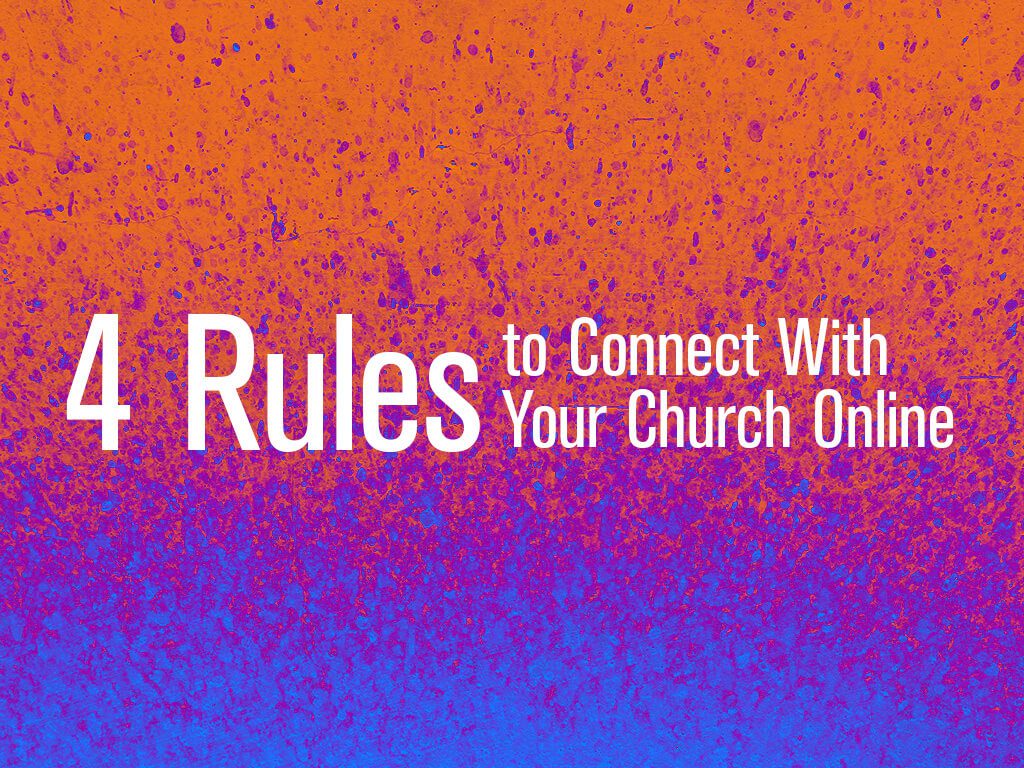So you want to connect with your church online. It seems so easy, just about everyone is already there, and you’d really love to feel engaged with your congregation. There’s just one problem… creating and maintaining an online community can be very tricky, not to mention overwhelming.
Here are a few rules for you to follow to create a thriving community that wants to engage with you:
1. Join Them Where They Are
I hope you are already doing this, and it probably goes without saying, but the first step to engage with your church online is to participate in the communities where they are active. Identify where your church members engage. Is it Facebook, Twitter, Pinterest, or maybe something else?
There are many tools that you will be temped to use to connect with your church online (and I’ll list some of them at the end of this article), but the best tool is the one that people will use. So if you are not already connecting with your congregation online, the first step is to join them where they are.
2. Keep it Simple Stupid (The KISS Rule)
You have probably heard this principle before and it is so true for engaging people online. People have such a short attention span, especially when it comes to the internet, and your congregation is going to be skeptical about any new tools you want them to use. The fastest way to destroy your online community is to overwhelm and confuse them.
To keep things simple, start by identifying the main thing that you are trying to accomplish by engaging your congregation online. Can you accomplish through channels where you are already connecting with your church (see rule #1)? If not, are there other tools that you could use?
If you can’t find an existing platforms with the feature set that you need, you may want to build your own solution. As someone who specializes in developing community sites I can tell you that there are some amazing benefits here but also some huge challenges. BuddyPress and Ultimate Member are two great tools that can help you get started but please make sure you have the resources to do this well. A poorly built community site is worth nothing. Feel free to reach out to me if this is something you are interested in doing. I’d be happy to advise.
3. Be Purposeful, Personal, and Punctual
Whatever tool or platform you use to connect with your church, make sure you have a clearly defined strategy. Use these 3 P’s to help guide your engagement:
- Purposeful – Be deliberate about the way you engage with your congregation online. Remember why you are trying to engage with them and let that guide each interaction.
- Personal – This may be the most important as well as the most difficult. Online communities are like telephones not megaphones. Don’t just shout your message, engage in conversation. Make sure that you are being real with your congregation.
- Punctual – Define expectations for your online engagement. Schedule time to be available and connecting with your congregation online. If you are engaging with them regularly, they’ll reciprocate.
This is a great opportunity to point out that you will need help. Identify some of the members in your church who excel at social media and ask for their help defining and executing your engagement strategy.
4. Promote It
Finally, don’t keep your online strategy a secret. Share with your congregation how you are hoping to engage with them online and ask for their participation. Start mentioning it Sunday mornings, and in your newsletters and bulletins. As often as you can, remind your congregation that you are online and create ways for them to engage with you.
Now as I mentioned there are some great tools out there to take your online engagement to a whole new level if you’ve already mastered rule #1. Here are a few of them:
- The City – If you are looking for a feature packed social network built specifically for the church, then this may be the perfect solution for you. It is a private community, which is perfect for creating a personal atmosphere, and it can really help you optimize communication and engagement with your whole church.
- Faithlife – Faithlife is a message board and communication platform built with a heavy emphasis on groups. If you are looking for an alternate to Facebook that is private and still very intuitive, this is definitely worth looking at.
- StudyChurch – StudyChurch is an engagement platform built for small groups. If your church creates it’s own small group material StudyChurch is a great place to distribute that material and encourage your small groups to engage online.
With these four rules to help your church members in place, you'll have a better shot of connecting with them online — and offline too.








[…] This article originally appeared here. […]
Great tips on online engagement. One issue I have with The City, however, is that it essentially contradicts your first point. Rather than joining them where they are, using The City encourages church members to join into a “our church only bubble.”
Great point! I think tools like The City can really improve online engagement but are not good places to “start”. If you are not already connecting with your church on Facebook, Twitter, etc. then it is probably not a good idea to jump right into a more advanced community tool. Start with something people know and then build from there.